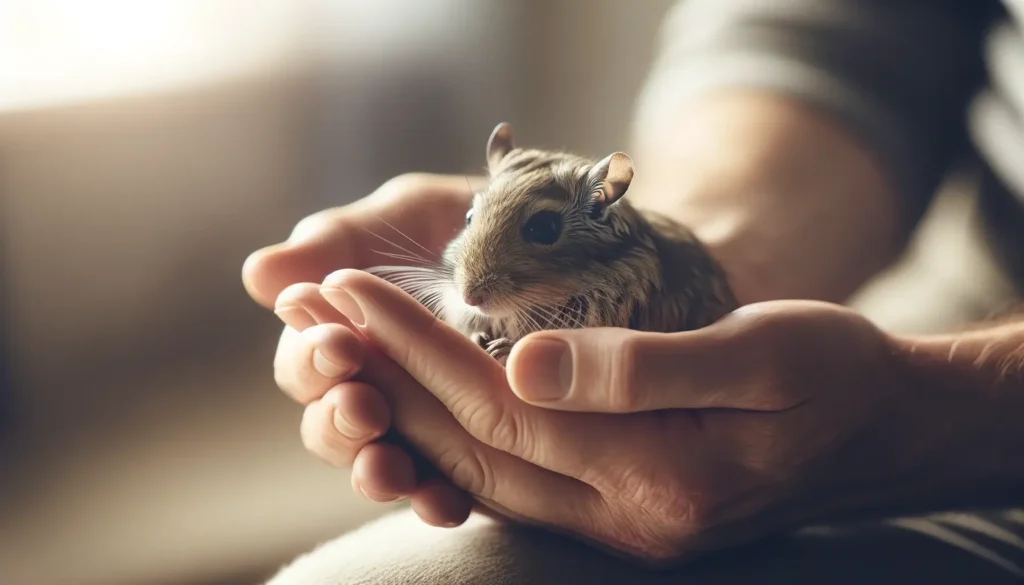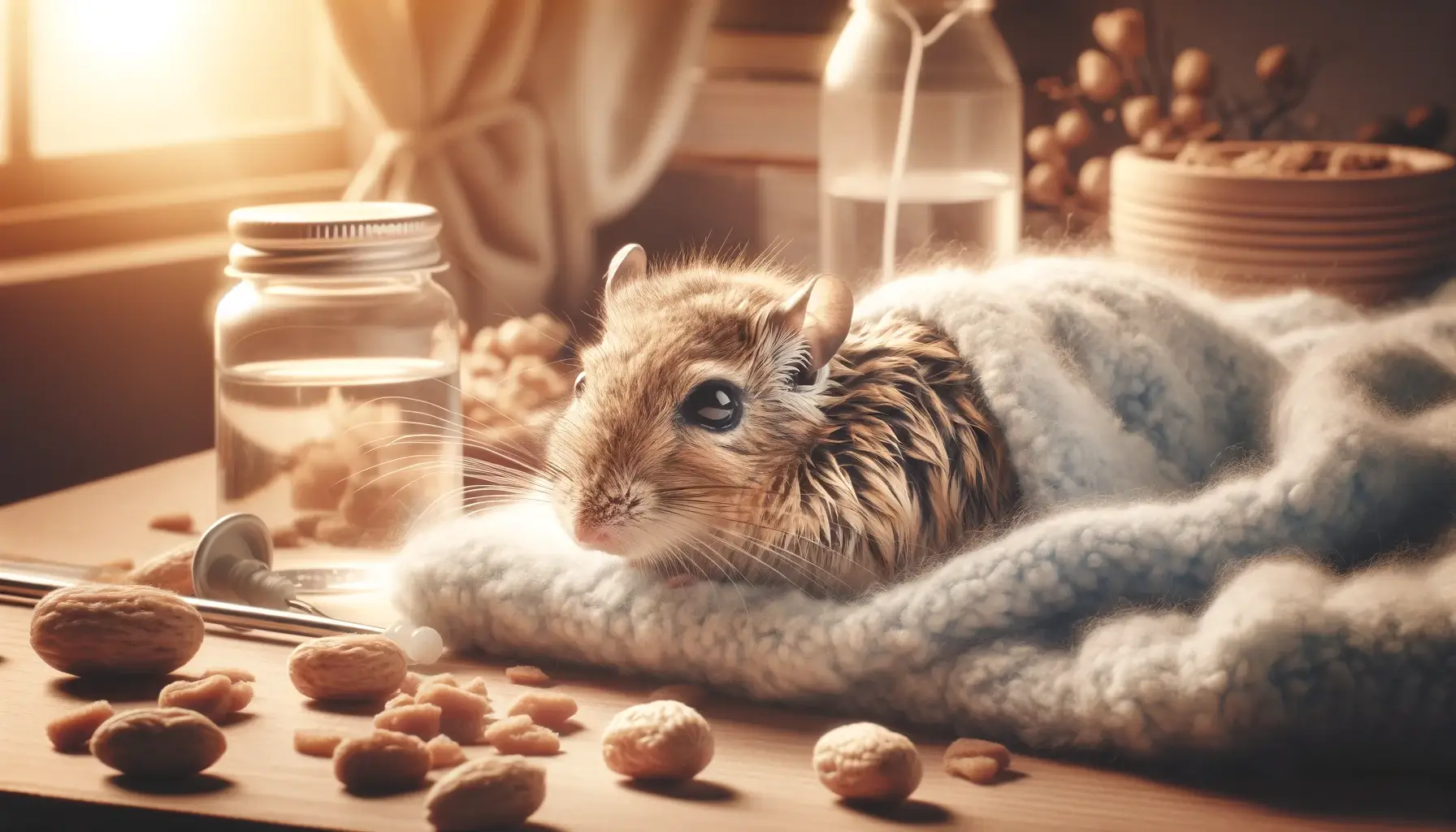Gerbils, with their curious eyes and energetic demeanor, quickly wiggle their way into our hearts. Recognizing the signs that your gerbil may be nearing the end of its life is crucial for any pet owner. It’s not just about preparing for the inevitable but ensuring we provide the best care and comfort in their final days.
In this article we will discuss what are the signs a gerbil shows before its death, when it’s time to seek veterinary help, and how to make your gerbil’s last moments as peaceful as possible.
Recognizing the Signs of Illness in Gerbils
Physical Signs
Changes in Appearance and Behavior: A healthy gerbil is lively, with a sleek coat and an eagerness to eat. When a gerbil’s coat turns dull and starts to flake, or if it shows a lack of interest in food and activities, it’s a signal that something is amiss. These changes can indicate a range of health issues, from stress to serious illness.
Scent Gland Tumors: Particularly in older gerbils, scent gland tumors can be a common ailment. Located on the belly, these glands can develop noticeable lumps if a tumor is present. While more common in males, females are not immune. Early detection and veterinary intervention are crucial, as tumors can grow rapidly without treatment.
Behavioral Changes
Decreased Activity and Interaction: Gerbils are naturally social and active. A noticeable decrease in these behaviors, as shared by gerbil owners on platforms like Reddit, often precedes more serious health issues. If your gerbil is less interested in exploring or interacting with you, it’s time to pay closer attention.
Eating and Drinking Habits: A decline in appetite or water consumption is a clear sign of distress. Gerbils need a steady intake of food and water to maintain their health. Any significant change in these habits warrants further investigation to rule out underlying health problems.
When to Seek Veterinary Help
Common Health Issues in Gerbils: Respiratory infections, tumors, and seizures are among the common health issues faced by gerbils. Symptoms can range from sneezing and coughing to unexplained weight loss and lethargy. If you notice any of these signs, consulting with a veterinarian is essential.
The Importance of Timely Veterinary Consultation: Real-life scenarios shared on forums like Pet Forums highlight the critical nature of early veterinary intervention. Waiting too long can lead to deteriorating conditions that are much harder, if not impossible, to treat. A vet can provide a proper diagnosis and treatment plan, whether it’s medication for an infection or surgery for a tumor.
Recognizing the signs that your gerbil is not just under the weather but may be dying is a difficult but necessary part of pet ownership.
By staying vigilant and responsive to changes in their health and behavior, you can ensure that your furry friend receives the care and comfort they deserve in their final days. Remember, it’s not just about extending their life but ensuring its quality.
Also read: Do Gerbils Hibernate?
How to Comfort a Dying Gerbil?

When the time comes that your gerbil is facing its final days, knowing how to provide comfort can make a significant difference in their well-being. It’s about creating an environment that’s as stress-free and comforting as possible, ensuring they feel safe and loved until the end.
Creating a Comfortable Environment: The right temperature and a quiet space are essential for a dying gerbil. Their enclosure should be kept within a comfortable temperature range, avoiding extremes that could cause distress.
Additionally, minimizing noise and disturbance helps them rest more peacefully. Consider isolating them from more active pets to reduce stress.
Providing Care and Affection: While some gerbils may seek solitude, others find comfort in gentle handling and the familiar presence of their owners. Pay attention to your gerbil’s cues; they may enjoy being softly spoken to or simply having you nearby. Remember, this time is as much about providing emotional support as it is about physical care.
FAQs
What are the most common signs that a gerbil is dying?
Common signs include noticeable lethargy, reduced interest in food and water, changes in physical appearance such as a dull coat or weight loss, and unusual behaviors or movements. Observing any significant shifts in their normal activities or health should prompt concern and possibly a consultation with a veterinarian.
Can a gerbil recover from a serious illness with proper care?
Yes, gerbils can recover from serious illnesses with appropriate veterinary care and diligent attention from their owners. Early detection and treatment are crucial to improving their chances of recovery. However, the outcome can vary depending on the illness’s nature and severity.
How can I make my gerbil more comfortable in its final days?
To comfort your gerbil in its final days, maintain a quiet, warm environment, offer their favorite foods, and ensure they have soft bedding. Gentle handling or simply being present can also provide comfort. Pay attention to their preferences for interaction during this sensitive time.
Is it necessary to take a gerbil to the vet if it’s dying?
Yes, consulting a veterinarian is advisable even if your gerbil is dying. A vet can offer guidance on palliative care to ease any discomfort, assess the situation accurately, and discuss options, including humane euthanasia if necessary, to prevent suffering.
Conclusion
Facing the impending loss of a beloved pet gerbil is a challenging time for any owner. Recognizing the signs of a gerbil nearing the end of its life allows us to provide the care and comfort they deserve in their final days.
From creating a peaceful environment to understanding when to seek veterinary help, our actions can significantly impact their quality of life. Remember, it’s not just about the care we provide but also the love and comfort we offer during these tender moments.
As we navigate this difficult journey, let’s cherish the joy and companionship our gerbils have brought into our lives, ensuring their last days are as comfortable and filled with love as possible.











